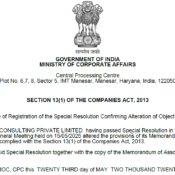Complete Guide for Startup Registration in India
Complete Guide for Start-up Registration in India – The last few years have been crucial for the Indian startup scenario. Many startups have become business unicorns generating billions of revenue each year. However, to reap the benefits of incentives offered by the government and take your startup to the next level, completing registration is important. Prakasha & Co. has compiled a Complete Guide for Start-up Registration in India vividly discussing the eligibility criteria, steps in the registration process, documentation required, and benefits of startup registration in India.
Learning about startup registration in India will also make you more aware and help you easily navigate the process. Give the blog a read to learn valuable insights about the registration process and enjoy the benefits that come along with startup registration in India.
Table of Contents
ToggleEligibility Criteria for Startup Registration in India
Before we discuss how startup registration in India works, let’s look at the eligibility criteria for registration. The criteria are based on the Companies Act 2016 which lays down guidelines for the eligibility of startup registration. Learning about the startup registration eligibility will give you more clarity and help you prepare for the process. This eligibility criteria is based on the age of the applicant, type of company, annual turnover, and prospects. Carefully go through the eligibility criteria to prepare for the startup India registration:
- The applicant should be above the age of 18 with Indian citizenship.
- The age of the organization should be at most 10 years.
- The company applying for the registration should be a Partnership Firm, a Private Limited Company, or a Limited Liability Partnership (LLP).
- The annual turnover of the company should be at most Rs.100 crore in any financial year since, its establishment.
- The business or organization should be formed by the founders without restarting an existing business.
- The business should have a scalable plan for future development or progress through innovative and elaborate planning.
Follow these Steps for Completing Startup Registration in India
The startup registration process is elaborate and comprises various stages that may vary from one location to another. To complete the registration process it is important to follow these steps in the right sequence and complete the registration. At Prakasha & Co. we have listed the registration steps below to help our readers understand the registration process and prepare for the registration process.
Step: 1 The first step in the registration process requires you to register your business a Private Limited Company, Partnership firm, or Limited Liability Partnership (LLP) or as per the requirement.
Step: 2 The second step is to register your business as a startup either offline or online. The online registration process requires you to visit the Startup India website and click the ‘Register’ button.
Step: 3 The step followed by the startup registration process includes obtaining the recognition from recognition from the Department for Promotion of Industry and Internal Trade (DPIIT). This step is important for getting access to various benefits.
Step: 4 The applicant needs to submit a range of documents for the smooth startup registration in India and enjoying various benefits.
Step: 5 Go through the eligibility criteria to ensure you meet all the standards.
Step: 6 After submitting all the documents and fulfilling all the requirements you will receive a recognition number. The concerned authorities review all the documents and information and issue the startup registration certificate.
List of Documents Required for Startup Registration Process
The documentation plays a crucial role in verifying the information submitted for the startup registration process. It is important to arrange all the documents on time for a smooth and hassle-free registration process. The prior knowledge of the list of documents will help applicants avoid any unnecessary delays in the process and ensure quick verification of the details. It is important to note that these documents may vary from one location to another. Therefore, you should consult experts for more guidance on the process. The list of documents needed for the startup registration in India is mentioned as follows:
- Patent and trademark details, if any.
- List of awards or certificates of recognition, if any.
- PAN (Permanent Account Number) Number.
- Incorporation/Registration Certificate of your startup.
- Proof of funding, if any.
- Authorization letter of the company’s authorized representative, LLP, or partnership firm.
- Proof of concept, such as a website link, a pitch deck, or a video (applicable for validation/early traction/scaling stage startups).
Benefits of Startup Registration in India
Registering your startup not only gives it a legal identity but also gives access to many government incentives and various other benefits. The benefits of the startup registration process can give a major boost to the growth of your startup and expand its reach in India. These benefits promote the spirit of entrepreneurship in youth and encourage them to take risks and establish their startup for long-term benefits. The range of benefits startups can enjoy on completing the registration process are mentioned as follows:
- Offer a three-year tax holiday in a block of seven years.
- Startups are exempt from paying tax on long-term capital gains.
- Simplified registration process using online startup portals.
- Startup owners can easily access venture capital through government-recognized platforms.
- Startups get a 50% rebate on trademark filing fees and up to 80% on patent filing fees.
Conclusion
Having a complete understanding of the startup registration process keeps you ahead of the competition and avoids any delays. This Complete Guide for Start-up Registration in India by Prakasha & Co. empowers readers to pre-arrange the required documentation and all the requirements for the registration process. Readers will find this blog highly insightful as it prepares them for all the steps included in the process.
Like Us On Facebook

Our Client's Review
EXCELLENTTrustindex verifies that the original source of the review is Google. Best place to file ur GST n IT returns .. They respond quickly, communicate well and get ur work done as per ur needs in a very short time ..Posted onTrustindex verifies that the original source of the review is Google. Best place for Income tax filingPosted onTrustindex verifies that the original source of the review is Google. Of all the CA, CS teams I have interacted with, they are the most prompt and organized. I have taken their services for almost 3 years now for various things like income tax queries, income tax filing, networth certificates, and compliance certificates. They always display a clear understanding of the law and are also able to explain it to you in layman terms. Overall a very resourceful and courteous team. Thank you for the support!Posted onTrustindex verifies that the original source of the review is Google. Best company secretary I bangalore ever seen such quick quality servicePosted onTrustindex verifies that the original source of the review is Google. Prakasha & Co has been a lifesaver for me when it comes to my tax dispute and filings with IT office. They are always very responsive and helpful whenever I have any questions or issues, I recently had an issue with my sister business GST filings, and they were able to quickly identify the issue and help me resolve it. They really go above and beyond to make sure their clients are taken care of.Posted onTrustindex verifies that the original source of the review is Google. ''The team at Prakasha& Co made sure my company was compliant with all the legal requirements. Their attention to detail and timely response was truly remarkable."Posted onTrustindex verifies that the original source of the review is Google. "I was impressed with the level of customer service provided by Prakasha& Co. They were always available to answer my questions and provide guidance throughout the company registration process."
Important Links
- Top 10 GST Registration Consultants in Bangalore
- Top 10 Best Income Tax Lawyers in Bangalore
- Top 10 Trademark Registration Consultants in Bangalore
- GST Registration in Bangalore
- Private Limited Company Registration in Bangalore
- Partnership Firm Registration in Bangalore
- Proprietorship Registration in Bangalore
- Trademark Registration in Bangalore
- Audit Frim in Bangalore
- CA Firm in Bangalore
- Accounting Services in Bangalore
- GST Lawyers in Bangalore
- Payroll Services Provider in Bangalore
- Payroll Consultant in Bangalore
- Income Tax Lawyer in Bangalore
All Categories
- Audit
- Blogs
- Bookkeeping Services
- Company Registration
- Company secretary Legal & Chartered Accountant
- Digital Signature Certificate (DSC) Services
- FSSAI Registration and Consultation
- GST
- Income tax
- Partnership Firm Registration
- Payroll Services
- Risk Management Services
- Startup Registration Process
- Trademark Registration
- Uncategorized








